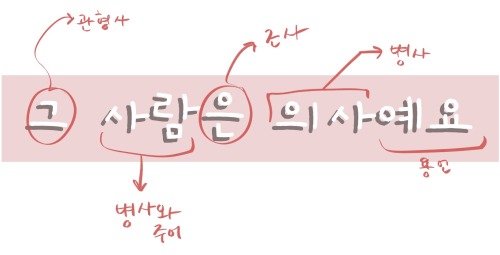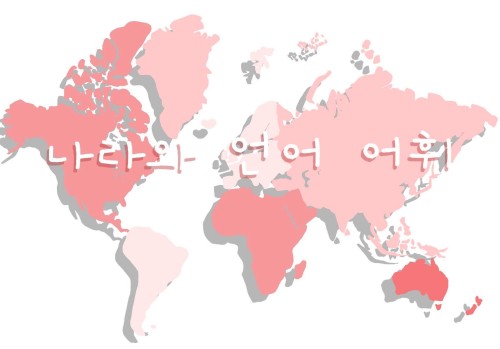#klangblr

이 블로그를 읽는 사람에게,
메모: 이 블로그는 최근의 게 아니다. 1월에는 이 블로그를 썼는데 여기에도 올리고 싶었다. 잘 읽어 봐줘라 ~~
안녕! 캐나다에서 온 금희주이다. 지난 일주일간 어떻게 지내냐?
난 우리 할머니의 댁에 기차를 타고 가서 새해를 함께 보냈다. 내 16번째 생일에, 할머니와 나는 함께 기차를 탔던 경험이 있다. 그 이후로 나는 기차 타는 걸 좋아하게 됐다. 18살 때 우리 할머니는 대학교에 다니는 나한테 소포를 자주 보내셨다. 그 이후로 우리는 펜팔을 했다. 할머니는 내 말을 항상 진심으로 들어주신다. 코로나 바이러스 때문에 2년이 지나도록 못 만났다. 난 우리 할머니가 너무 보고 싶었다. 내가 사랑하는 사람들 특히 우리 할머니가 코로나 바이러스와 같은 것들로 인해 아프실까 걱정된다. 요즘 여러분의 가족들은 잘 지내니?
처음에 우리 조부모님은 내가 한국어를 공부하는 게 이상하다고 생각하셨다. 조부모님은 나한테 “우리는 독일계 캐나다 사람인데 왜 한국어를 배우고 있니?”라고 물어보셨다. 그 질문은 나를 죽일 것이다.
난 조부모님께 내가 언제나 언어를 사랑한다고 말했다. 진실이다. 언어학이 내 전공이었다. 그렇지만 모든 언어를 통틀어 제일 생각나는 언어는 한국어였다.
9월에 (7개월 동안) 한국어 수업을 듣기 시작해서 나는 한국어 말하기와 듣기가 중급수준으로 빠르게 올랐다. 한국어 수업을 듣기 전에는 한국말로 못 할 것 같았다. 매일 한국어를 공부한다고 해도 한국어 실력을 향상시키지 못했다. 왜 그랬을까?
왜냐하면 한국 사람들과 한국어로 말하지 않았기 때문이다. 난 항상 내가 한국에 가기 위해서 한국어 공부를 열심히 해야 된다고 생각했지만 한국어를 사용하는 나라에 살지 않기 때문에 한국어를 배우기 어렵다. 16살때부터 한국어를 배우기 시작했는데 22살인 지금까지 왜 난 한국어로 편하게 말할 수 없을까?
한국 사람들과 한국어로 말한 이후로 한국어를 쉽고 편하게 배우기 시작했다. 100년 동안 한국어를 공부해 봤자 한국말로 대화하지 않으면 한국어를 배우는 외국인은 한국어가 유창하지 않을 것이다.
일주일 전에는 왜 한국어를 배우고 있는지 생각해보는 시간을 보냈다. 올해 한국에 가려고 하는데 한국에 영원히 살고 싶지는 않다. 캐나다는 좋지 않지만 나쁘지도 않다. 완벽하진 않다. 그렇지만 나는 한국 사람들이 캐나다를 사랑하는 이유를 알 것 같다. 캐나다는 많은 다른 나라에서 이민을 온 사람들로 이루어져 있다. 그래서 캐나다는 많은 나라의 문화가 섞여 있다. 또 우리는 특정한 종류의 문화가 있다. 이 문화는 한국과 조금 비슷하다.
난 어렸을 때 태권도 수업을 들어서 어린 나이에 한국에 대해 조금 알았다.
한국과 캐나다는 너무 좋은 관계를 가지고 있다. 나는 캐나다를 싫어하는 한국인을 한 명 밖에 못 봤다. 하지만 미국을 싫어하는 많은 한국인과 캐나다인을 많이 봤다. 캐나다에 많은 한국인이 살고 있기 때문에 한국의 문화가 캐나다를 영향을 미쳤다. 토론토에는 한인 타운 두 개 있다. 밴쿠버에서 한국인만 사는 한국 이웃집들이 많다. 그래서 캐나다가 한국인들이 친숙하다. 한국인이들은 다른 문화를 잘 받아들이는 캐나다를 좋아하는 데다가 캐나다 사람들의 친절한 성격을 좋아한다.
외국인은 한국에 쉽게 사랑에 빠진다. 한국인은 캐나다에 쉽게 사랑에 빠진다. 내가 아는 한국 오빠는 한국과 캐나다는 너무 다르다고 했다. 왜냐하면 한국에는 한 개의 문화가 있다고 했거든. 다른 나라에 태어난 한국인은 한국이 아니라고 하는 거 같다. 다른 나라에서 태어난 한국인도 그 나라 사람이 아니라는 것 같다. 그럼, 그 한국인들은 누구니?
오빠가 한 말에 동의하다. 대부분 캐나다에서 온 문화를 한국에서 온 것이랑 비슷하는데 많이 중요한 건 다르다. 캐나다의 문화는 물처럼 곧잘 변한다.
한국의 문화는 고정된 튼튼한 바위 같다. 계곡에서 물은 바위를 따라 흐르고, 바위는 물에 움직이지 않다. 하지만 물이 흐르면 바위가 매끄러워질 것이다. 어려운 문제 같다.
한국인들은 캐나다에서도 여전히 한국인의 정체성을 가지고 있기 때문에 한국인들이 캐나다를 매우 좋아한다.
읽어 줘서 고맙다.
희주 올림
내 방을 자세히 묘사하고 있다
*italki로 한국어 숙제 위한 일기예요.
안녕! 난 희주고 오늘은 내 방을 자세히 묘사할 것이다! 난 Lindie Botes의 웹사이트에서 이 주제를 받았다. 시작하자~
먼저, 내 방은 넓고 보통 깨끗하다. 더러우면 공부하는 게 어려워지니까 일주일에 내 방을 한 번 청소한다. 내 방의 벽은 하얗고 벽에는 사진 한 개밖에 없다. 사진은 내가 대학교 입학 전 나와 여동생이 함께 찍은 사진이다. 사진 옆에는 외할머니께서 주신 달력이 있다. 달마다 다른 동물의 사진이 있다. 이번 달 사진은 퉁퉁한 회색 고양이다. 달력 아래에 내 책상하고 노트북이 있다. 집에서 할 일이 많이 있으니까 모니터 두 개나 있다. 나는 학생이면서 영어 선생님이다—그래서 할 일이 많다.
책상 옆 검정 책장에는 책들이 많이 놓여있다. 판타지하고 로맨틱소설 읽는 걸 좋아한다. 난 어렸을 때부터 항상 책을 읽고 있었다. 책 읽는 걸 너무 좋아하기 때문에 내 생일마다 가족은 나에게 많은 책을 준다. 선물을 고르기 쉬울 거 같다.
책장 위에는 식물이 있다. 내 방 안에 식물 3 개나 있다. 식물을 더 구하고 싶은데 곧 한국에 갈 거기 때문에 키울 수 없다. 캐나다에 다시 들어올 때 더 구할 것이다~~! 내 침대는 내 책장의 왼쪽에 있다. 내 이불은 올리브 그린이다! 베개 커버 두 개의 색깔이 똑같다. 침대 위에 더 편한 베개들은 회색 커버가 있다. 침대 위에 노란색 담요도 놨다. 이 담요는 엄마께서 주신 선물이다.
이 방을 너무 좋아하는데 곧 이사를 다시 할것이다. 그래서 새로운 방도 묘사할까.
사실 다 된 것 같다! 여러분의 방은 어떤가? 읽어 줘서 고맙다!
희주 올림
Post link
anon asked: what’s the difference between -는 동안 and -(으)면서? I’m so confused
This is a great question! I am assuming you’re asking because they can be translated as the same thing into English. I understand why there will be confusion because, under context, these grammar points aren’t really distinguishable in English as they are in Korean.
-는 동안; while, during [goherefor more]
Use this when:
- You’re not talking about the same doer of the action [엄마가 설거지를 하는 동안 아빠는 화장실을 청소했어요 - Mom cleaned the dishes while dad cleaned the bathroom]
- You are talking about the same doer of the action [어제 공부하는 동안 문제가 생겼어요 - I found a problem while studying yesterday]
- The doer of the action is inanimate [비가 많이 오는 동안 구름이 어두워졌어요 - the clouds darkened while it poured]
Try to remember that 동안 is used for a period of time; “-는 동안”은 일정 기간 동안 사용되다. Consider the example in the first rule. Think of the context of this sentence as: during the time it took for my mom to do the dishes, my dad cleaned the bathroom. Yes, you can switch it around because contextually it means the same thing, “아빠가 화장실을 청소하는 동안 엄마는 설거지를 했어요.”
NOTE:Because “-는” attaches to the dependent clause [엄마가 설거지를 하는 동안], the verb before it does not take tense and underlyingly takes the tense of the independent clause’s verb [아빠는 화장실을 청소했어요]. I used the past tense [과거] in my examples, but you can use the present tense [현재] or future tense [미래], obviously, depending on what you want to say.
More Examples:
- 한국에서 사는 동안 한국어를 빨리 배웠어요 - While I lived in Korea, I learned Korean quickly.
- 대학교 디니는 동안 어디에서 살 거예요? - Where are you going to live while attending University?
- 아빠가 저녁을 준비하는 동안 저는 보통 숙제를 해요 - I usually do my homework while my dad makes dinner.
- 희주가 세수하는 동안 혜민은 이를 닦았어요 - While Heeju washed her face, Hyemin brushed her teeth.
- 제가 자는 동안 고양이는 제 식물을 먹었어요 - While I slept, my cat ate my plants.
-(으)면서; while
Use this when:
- The doer of the action is the same [희주는 먹으면서 유튜브를 봐요 - Heeju watches YouTube while eating]
- The action is happening simultaneously [지하철을 기다리면서 친구하고 전화했어요 - I waited for the metro while I called my friend]
- Contrasting two actions [대현은 한국에서 일하고 싶다고 하면서 한국어를 못해요 - Daehyun said they wanted to work in Korea, but they don’t speak Korean]
NOTE: You can only use -(으)면서 when talking about the same doer of the action or state. For example, 희주는 일하는 동안 음악을 들었어요 and 희주는 일하면서 음악을 들었어요. BOTH work and are grammatically correct. The working and listening to music is being done by 희주, whether at the same time, or during work. However, a sentence like “희주는 일하면서 혜민은 음악을 들었어요” is grammatically incorrect. Even if 희주 and 혜민 are doing this at the same time, you must use -는 동안.
More Examples:
- 샤워하면서 노래를 불렀어요 - While showering, I sang
- 요리하면서 요리법을 봐요 - While cooking, I read a recipe
- 수업을 들으면서 메모를 해요 - I take notes while in class
- 운전하면서 문자를 보내지 마세요 - Don’t text while driving
- 희주는 숙제를 하면서 음악을 들어요 - While Heeju does her homework, she listens to music
Differences between the two:
- You can use 동안 with nouns [명사], you cannot use (으)면서 with nouns. However, you can use (이)면서 with nouns in conjunction with 이다 [저는 대학생이면서 선생님이에요 - I am a university student and a teacher]. This expresses two states of being that happen at the same time.
- You can not use -는 동안 to contrast actions
- You MUST use the same doer of action with (으)면서
- -는 동안 expresses an action that occurs during a period of time; -(으)면서 does not necessarily take place at a specific time
Similarities between the two:
- You attach tense at the end of the sentence, you cannot attach tense to the dependent verb
- They are, most of the time, interchangeable; just remember the rules above
BONUS! -(을/ㄹ) 때; when
The closest origin of “때” I could find in 한자 is “時”. “때” refers to an event/time/period of action (another translation of 時 can be 시).
Things to remember:
- You can use -때 with nouns and -(을/ㄹ) 때 with verbs.
- Because it refers to a specific moment, you can attach tense to -(을/ㄹ) 때
- You can use this with adjectives!
- Can be used with -까지 and -부터! [때 + 부터 = since// 때 + 까지 = until]
Examples:
- 비행기를 도착할 때 엄마하고 전화할게요 - When my plane lands, I’ll call my mom
- 대학생[이였을] 때 돈이 없었잖아요 - When I was a uni student, I didn’t have money, as you know
- 한국 친구에게 한국말로 하기 시작했을 때 마이클은 깜짝 놀랐어요 - When I started speaking Korean to my Korean friend, Michael was surprised!
- 공부할 때 음악을 들어요 - When I study, I listen to music
- 시간이 있을 때 알려주세요 - Let me know when you have time
- 16살 때부터 한국어를 배웠어요 - I’ve been learning Korean since I was 16
- 이렇게 될 때까지 더 씻어야 해요 - You have to wash it more until it’s like this
- 한국에 갈 때 홍대하고 제주도 방문하고 싶어요 - When I go Korea, I want to visit Jeju and Hongdae
- 혜민 언니는 한국에 들어갔을 때 제가 너무 슬펐어요 - I was so sad when Hyemin when back to Korea
- 어렸을 때 그림을 그리기 시작했어요 - I started drawing when I was a kid
Hope this helps! If there’s any more confusion, please, don’t hesitate to send another message or ask!
Happy Learning :)
~ SK101
(으)시 vs Deferential [Korean Honorifics]
anon asked: what’s the difference between 먹다 and 드시겠습니다. You say they both mean eat but i am confused? Help!
@femaletype asked: next do (으)시 vs -세요 vs -ㅂ/습니다 Bc honorific vs deferential is the bane of my existence
First, I will give a list of honorific verbs and nouns, then explain the honorific ending! It’s important to note an “elevation” of formality; who is being elevated! In this case, there are three types:
- verbs that elevate* the subject
- verbs that elevate the object
- verbs that elevate the recipient of the action (usually used with the honorific particle 께)
*elevate = who are talking about in an honorific way?
높임말 동사; Honorific Verbs
- (2) 만나다 / 보다; 뵙다 [to see, to meet]
- (1) 먹다; 드시다 / 식사하다 / 잡수시다 [to eat]
- (1) 마시다; 드시다 [to drink]
- (3) 주다;드리다 [to give]
- (1) 있다; 계시다 [to stay]
- (1) 죽다; 들어가시다 [to die]
- (1) 아프다; 편찮으시다 [to be hurt/in pain]
- (1) 말하다; 말씁하시다 [to speak]
- (1) 자다; 주무시다 [to sleep]
- (3) 묻다; 여쭈다 [to ask]
- (1) 배고프다; 시장하시다 [to be hungry]
- (2) 데리다; 모시다 [to accompany]^
^ the plain form 데리다 is more commonly used as a compound verb with 오다 or 가다, but that can be it’s own separate post if people are interested.
높임말 명사; Honorific Nouns
- 이름; 성함 [name]
- 나이; 연세 [age]
- 집; 댁 [house]
- 생일; 생신 [birthday]
- 밥; 진지 / 식사 [food, meal]
- 병; 병환 [disease, illness]
- 술; 약주 [alcohol]
- 아이; 자제분 [child]
- 이; 치아 [tooth]
- 말; 말씀 [word]
It’s important to note, that outside of these specific verbs, you can realistically elevate any verb in Korean using (으)시.
-(으)시 vs. (스)ㅂ니다; Deferential Honorific
At this point, you should be familiar with plain style conjugation patterns (-어/아요). The deferential style is the infamous -(스)ㅂ니다 that gives the statements their formal ending. Of course, as we know, -(스)ㅂ니다 is more formal than -어/아요. If at any point, you are unsure as to which formality to use, always use the deferential style.
Honorifics can attach to both the deferential and polite styles, but are used in different contexts illustrated below:
- [polite]집에 가요 - I’m going home
- [deferential]집에 갑니다 - I go home
- [polite + (으)시] 집에 가세요 - Go home, (hon. subject)
- [deferential + (으)시] 집에 가십니다 - (hon. subject) goes home
Remember, you cannot, ever, at any point, ever, use (으)시 for yourself.
-(으)세요
When (으)시 is attached to the polite style conjugation, there are two usages; (1) to show respect, (2) to create an imperative.
The use of -(으)시 elevates the subject, object, or any recipient of the action who is older, in a higher position, or placed above you in respect. Of course, you will hear some Koreans complain about this politeness hierarchy, however, that is not an excuse to speak in an intimate way to a doctor, professor, or an elder–this is not about being close, this is about being respectful.
The biggest difference between the deferential -(스)ㅂ니다 and the honorific -(으)시 is that one acknowledges the elevation of the subject/object/recipient of action [-(으)시] while the other acknowledges the formality of the environment around them [-(스)ㅂ니다].
When talking to someone closer to your age (seemingly), you are able to use [polite + (으)시] to express politeness without being overtly formal. This is why, in restaurants, you will use phrases like:
- 순두부찌개 하나 좀* 주세요 - please give me tofu stew
- 물 좀 주세요 - please give me water
- 아아 한잔 좀 주세요 - please give me an iced americano
*좀 softens the request
Where the server will use an honorific term:
- [드시다] 뭐 드시겠습니까? - what will you eat/drink?
- [드리다] 영수증을 드릴까요? - do you want me to give you a receipt?
Note that the -까 creates an interrogative phrase.
All that said…
You can add (으)시 to any verb in order to create it’s honorific counterpart. This goes for literally any verb. If you are truly lost and cannot remember how to use the honorific form of 먹다 then you can use some form of 먹으시다. Examples:
- [to answer/reply] 대답하다 + (으)시 = 대답하시다
- [to sing] 노래부르다 + (으)시 = 노래부르시다
- [to listen] 듣다 + (으)시 = 들으시다
Hope this helps! Honorifics are honestly difficult. So difficult, that even switching formality without honorifics is still considered rude (from intimate to plain to deferential). You’ll hear people say it’s okay to not use the proper formality because you’re a foreigner, but I think that’s a lazy solution to learning. If you want to learn properly, do it properly.
Example Sentences:
- 무슨 책을 읽으세요? - what book are you reading?
- 한국 분이세요? - are you Korean?
- 한국어를 가르칠 사람은 김 선생님이세요 - Mx. Kim will teach Korean
- 엄마가 전화하셨어요 - My mom called
- 부모님께서 은행에 가셨어요 - My parents went to the bank
That being said, it’s okay to mess up formalities so long as you catch the mistake and correct yourself. The listener (older Korean or friend) will greatly appreciate the self-assessment.
If there’s still some confusion, let me know!! Happy Learning :)
~ SK101
p.s. for more conjugations, you can go here!!
anon asked: what’s the difference between 끊다 and 자르다?
Great question! Hopefully my answer helps! Both can mean “to cut” but here’s a better explanation:
One is used abstractly, while the other is used for more concrete situations. When you want to cut something for a recipe, or cut a piece of paper, you use 자르다. When you want to hang up the phone, or quit smoking, you use 끊다.
끊다 - cut (something abstract); not a literal cutting of something
- 이만 끊을게요 - I’ll hang up (on the phone)
- 앞으로 담배를 끊을 거예요 - From now on, I’m going to quit smoking.
자르다 - cut (something concrete); a literal cutting of something
- 종이를 반으로 자르세요 - cut the paper in half
- 이렇게 잘라야 해요 - you should cut it like this
- 머리 잘라서 머리가 짧아졌어요 - my hair got shorter because I cut it
Hope that helps! Happy learning :)
~ SK101
anon asked: hi! i’m still in the process of learning hangul and i know there’s is no specific order to learn korean but what was the easiest route for you? this may sound silly because i’m thinking too far ahead but when/how did you get to the point of not having to use a dictionary or translator for everything? or is that something i’ll always have to do? i’ve only learned one other language and it was spanish. i think i was able to pick up on it quicker because of cognates that are similar to english and i think those also exist for english and korean but i find them more difficult to identify due to the alphabet being different. i hope i didn’t make it sound confusing. thank you for any tips! i appreciate it all
안녕하세요! 늦게 네 질문이 읽어서 미안해요!
이걸 기억하세요: 여러분은 새로운 언어를 배울 때 항상 사전을 사용할 거예요.
만약 한국어를 배우면 다른 사람들마다 다 배우는게 달라요. 우리가 이걸 이미 알고 있었어요. 그렇지만 사람들은 한국어를 대화하지 않으면 한국어를 배우지 못해요. 우리는 “아 한국에 가려고 한국어를 배워"라고 말하지만 한국어를 사용하는 나라에 살지 않아서 한국어를 배우기 어려워요. 우리 한국말로 말해야 돼요. 진짜로요.
저는 한국사람들과 한국어로 대화했기 때문에 한국어를 쉽게 배울 수 있었어요. 매일 한국어 문법과 어휘도 배우는데 한국말을 사용하지 않으면 기억을 못해요. 항상 "쓰기, 읽기가 제일 쉬워"라고 생각하고 듣기, 말하기 연습을 안 했어요. 16 살때부터 한국어를 배우기 시작했어요! 지금 22살이잖아요!! 제가 왜 한국말로 편하게 말할 수 없었을 가요?!
한국말로 대화하지 않았기 때문이에요.
이건 제 충고예요. 만약 한국어를 쉽게 배우고 싶으면 한국말로 해야 돼요. 너가 문법과 어휘도 배워야 되지만 말하기도 해야 돼요. 하루에 5분이라도요
도움이 됐으면 좋겠습니다. 잘 배우세요.
ENG Trans.:
Hello! Sorry for reading your message late.
Remember this: when you’re learning a new language, you will always use a dictionary (in a way, fluency is arbitrary).
If you want to learn Korean, everyone learns different. Of course, we already knew that. However, if a person doesn’t speak in Korean, then they won’t learn Korean. We say things like, “I am learning Korean to go to Korea,” but most of us don’t live in a country that actively uses Korean. That makes it really hard to learn Korean. If we wanna learn, we have to speak Korean. Seriously.
It wasn’t until I spoke to native Korean speakers that I actually learned Korean easily. Everyday, I would learn grammar or vocab but it would mean nothing to me if I didn’t use it. I would forget it. I used to think, “Writing and reading are the easiest,” but I never practiced speaking and listening. I’ve been learning since I was 16!!! I’m 22 now!! Why couldn’t I speak Korean comfortably???
It’s literally because I never spoke in Korean.
This is my advice. If you want to be comfortable in Korean (with or without a dictionary), use it. Learn the vocab and grammar, but you HAVE to speak Korean. Even if it’s just for 5m a day.
I hope this helped! Happy Learning :)
~ SK101
anon asked: what’s the difference between 부터&까지 and 에서&까지? Please let me know
안녕하세요! Hello! The difference is quite simple :)
부터 ~ 까지: (시간)
- specific to time in general
♡ Example Sentences:
- 1시부터 2시까지 친구를 만났어요
I met my friend from 1:00 to 2:00 - 월요일부터 금요일까지 일해요
I work from Monday to Friday
에서 ~ 까지: (장소)
- specific to distance, destination, and place
♡ Example Sentences:
- 캐나다에서 한국까지 어떻게 가요?
How do I get from Canada to Korea? - 학교에서 대학로까지 버스로 갔어요
I went from school to Daehangno by bus
Hope this helped! If you need any more examples, let me know! These are pretty good grammatical points to know.
Happy Learning :)
~ SK101
A lot of people liked PART TWO a lot! Thank you for all your kind comments and praise! PART THREE will cover the skin and necessary vocabulary underneath. Enjoy <3
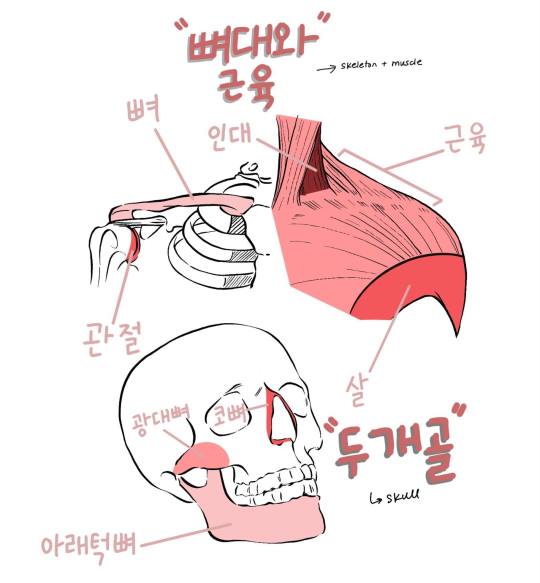
*picture is of a chest (half skeleton, half muscle) and a skull (necessary vocabulary is highlighted)
- 뼈대 - skeleton
- skeleton can also be translated as: 해골 and 골격
- major differences between 뼈대, 해골, and 골격: 뼈대 and 해골 are the most similar. Sometimes 해골 can refer to only the skull (see skull for a better understanding) - both of these refer to dead skeletons. However, 해골 comes from 한자 ‘骸骨’. The word 골격 also comes from 한자 meaning 骨格 (frame, figure) or 骨骼 (skeleton).
- 근육 - muscle
- 뼈 - bone
- 인대 - ligament
- 살 - flesh (not skin, but the ‘meaty-like’ part; almost like fat)
- 관절 - joint
- 두개골 / 해골 - skull
- major difference between 두개골 and 해골: both come from 한자 ( 두개골 = 頭蓋骨 // 해골 = 骸骨), however, 해골 (according to a Korean native speaker), refers to the picture of a skull. Whereas 두개골 refers to the actual, physical skull.
- 광대뼈 - cheekbone
- 아래턱뼈 - mandible (jaw)
- 코뼈 - nasal bone
Example Sentences:
- 다행히뼈에는 이상이 없나요 - Fortunately, there is nothing wrong with the bone(theboneis alright/not broken).
- 우리 오빠는 축구를 하다 인대가 늘어났어요 - My brother pulled a ligamentwhile playing soccer.

*picture is of an eye and a pair of lips with blemishes (necessary vocabulary is highlighted)
- 피부 - skin
- 여드름 - pimple / zit
- 기미 / 주근깨 - freckles
- major difference between 기미 and 주근깨: 기미 refers to spots you get from the sun (not usually pleasant) while 주근깨 translated to actual freckles
- 다래끼 - sty
- 수염 - facial hair (this can be a mustache or beard)
- 애교 살 - the fatty pocket under the eyes
- 다크서클 - dark circles
- 점 - mole, spot
- 흉터 / 흠 - a scar, blemish
- major difference between 흉터 and 흠: 흉터 refers to an actual scar made a long time ago whereas 흠 considers all types of blemishes or flaws on the skin
- not to be confused with 상처 (injury/wound that JUST happened) and 멍자국 (bruise)
- 입슬허피스 / 입슬의 발진 - cold-sore
- difference: 입슬허피스 = lip herpes VS 입슬의 발진 = lip rash
Example Sentences:
- 여드름을 짜다가 세균에 감염될 수도 있어요 - If you pop your pimples, you might spread germs.
- 저는 작녀에 얼굴에 있는 점들을 뺐어요 - I had a few molesremoved.
Extra Vocab to Know:
- 주름(살) - wrinkles / crease
- 혹 - bump / lump
- 땀 - sweat
- 눈곱 - sleep (the goop in your eye when you wake up; eye boogies)
- 하품(하다) - sigh (to sigh)
- 방귀 - fart
- 트림(하다) - burp (to burp)
- 소름 - goosebumps / goose pimples
- 딸꾹질(하다) - hiccup (to hiccup)
I received an ask last night asking about the word for ‘throat’. You could use 목 to describe your throat but a more technical term would be 목구멍. However, this isn’t used as often. For example:
목이 아프다 - a sore throat
희주는 눈물에 목이 메였다 - tears clogged Hee-Ju’s throat
Hope that clears up some confusion!
Happy Learning :)
~ SK101
As promised, here’s PART TWO of the in depth body vocab!PART ONEcovered the face / head. Today we will look at the back, torso, and most internal organs. Enjoy <3
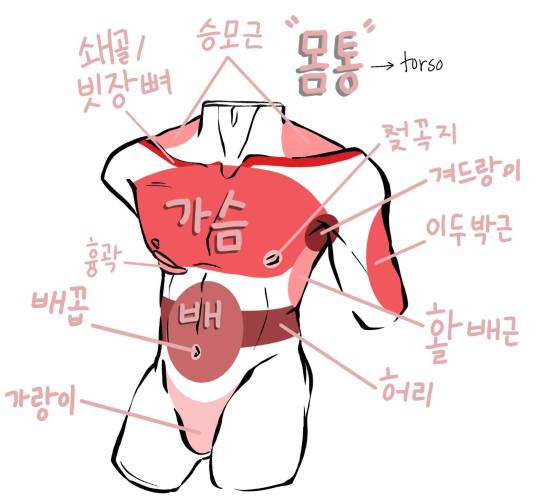
*picture is of a male presenting torso (necessary vocabulary is highlighted)
- 몸통 - torso
- 승모근 - traps
- 쇄골 / 빗장뼈 - collar bone
- major difference between 쇄골 and 빗장뼈: Both can translate to the scientific name ‘clavicle’. However, 쇄골 comes from 한자: ‘鎖骨’.
- 흉곽 - ribcage
- 가슴 - chest / breast
- 젖꼭지 - nipple
- 겨드랑이 - armpit
- 겨드랑이 털 - armpit hair
- 이드박근 - bicep
- 배 - belly, stomach (exterior)
- 배꼽 - bellybutton
- 활배근 - lats
- 허리 - waist
- 가랑이 - crotch
Example Sentences:
- 저는겨드랑이에서 땀이 괴도하게 났었어요 - I used to sweat a lot in my armpits
- 밥을 많이 먹어서 배가 너무 불러요 - My stomachis full because I ate too much
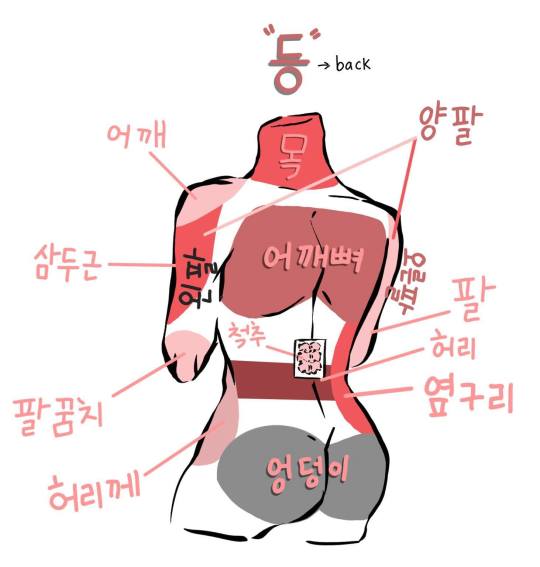
*blank back cut off at the legs and neck (necessary vocabulary is highlighted)
- 등 - back
- 목 - neck
- 어깨 - shoulder
- 팔 - arm
- 왼팔 - left arm
- 오른팔 - right arm
- 양팔 - both arms
- 삼두근 - triceps
- 팔꿈치 - elbow
- 척추 - spine
- not to be confused with 척수 which refers to the spinal cord
- 허리 - waist
- 옆구리 - side
- 허리께 - hip
- 엉덩이 - butt / buttocks
Example Sentences:
- 양팔을 위로 줄 뻗어 보세요 - Please stretch your armsout
- 하루 종일 앉아 있었더니엉덩이가 아파요 - My butthurts from sitting on it all day
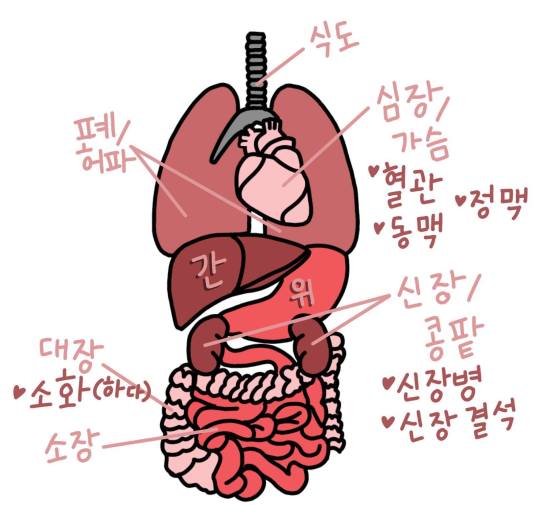
*picture of internal organs including the lungs, heart, liver, stomach, kidneys, and intestines (necessary vocabulary is highlighted)
- 장기 - organ
- 식도 - esophagus (’gullet’ in reference to animals)
- 폐 / 허파 - lung
- major difference between 폐 and 허파: 폐 is used in more medical contexts over 허파
- 심장 / 가슴 - heart
- major difference between 심장 and 가슴: 심장 refers to the literal pumping organ whereas 가슴 is the general area of the chest but can be used as an emotional heart (as opposed to 마음, which is the feeling in your heart)
- 혈관 - blood vessel
- 정맥 - vein
- 동맥 - artery
- 간 - liver
- 위 - stomach (internal)
- 신장 / 콩팥 - kidney
- major difference between 신장 and 콩팥: 신장 comes from 한자: ‘腎臟’, where 콩팥 is the native Korean version.
- 신장병 - kidney disease
- 신장 결석 - kidney stone
- 장 - intestine
- 대장 - large intestine
- 소장 - small intestine
- 소화 (하다) - digestion (to digest)
- 혈액 / 피 - blood
- major difference between 혈액 and 피: 혈액 is the medical form!
Example Sentences:
- 저는 수년간 위에 문제가 있어 왔어요 - I’ve had issues with my stomach for years
- 어젯밤 먹은 게 고화가 잘 안 돼요 - I’m having trouble digesting what I ate last night
Extra Vocab to Know:
- 배설(하다) - excretion (to excrete)
- 대변 / 똥 - stool or poop
- major difference between 대변 and 똥: 대변 is more like feces whereas 똥 is much more casual in speech
- 소변 / 오줌 - urine or pee
- major difference between 소변 / 오줌: same as above, 소변 is more like urine where 오줌 is more casual
- both 소변 and 대변 come from 한자: 大便 (대변) and 小便 (소변)
- 싸다 - to poop/pee
- 누다 - to poop
- 음경 - penis
- 자궁 - womb
This is obviously for educational purposes, so I hope tumblr lets it stay up. But here’s PART TWO of the in depth body vocab!
Happy Learning :)
~ SK101
품사 - Parts of Speech
Since my post from yesterday, I got a lot of requests to do more linguistic terms. I don’t think this is a comprehensive list, so if there’s any that you know that aren’t here, put it in the chat! Enjoy <3
♡ 자음 – consonant
ex. ㄱ, ㄷ, ㄴ, ㅅ, ㅇ
♡ 모음 – vowel
ex. 아, 어, 이, 애
Hangul [ x||x]
♡ 초성 – word-initial consonant
ex. ㅂ in 볶음
♡ 중성 – word-medial consonant
ex. ㄲ/ㅇ in 볶음
♡ 종성/ 받침 - word-final consonant (받침 literally means “support”)
ex. ㅁ in 볶음
♡ 글자 – letter
♡ 발음(하다) – pronunciation (to pronounce)
ex. 볶음 -> 보끔
♡ 예사소리/평음 – plain consonant (lit. ordinary sound/peaceful note)
ex. ㄱ, ㅂ, ㄷ, ㅅ, ㅈ
♡ 된소리/경음 – tense consonant (lit. Fortis sound/hard note)
ex. ㄲ, ㅃ, ㄸ, ㅆ, ㅉ
♡ 거센소리/격음 – aspirated consonant (lit. rough sound); 거센 from 거세다 (to be rough/violent)
ex. ㅋ, ㅍ, ㅌ, ㅊ
✿ 한국어를 배우는 외국인들은 된소리와 거센소리의 발음을 어려워한다. Foreigners learning Korean have a difficult time pronouncing tense and aspirated sounds.✿
♡ 복합어 – compound
ex. 물고기 (물 “water” + 고리 “meat”), 남자친구 (남자 “boy/man” + 친구 “friend”)
♡ 파생어 – derivative
ex. -관 (building – from 館); 영화 “movie” + -관 = 영화관 “theatre (lit. movie building)”
♡ 접두사 – prefix
ex. 되- (similar to “re-” prefix in English); 되- + 들다 “to enter” = 되들다 “to reenter”
♡ 접미사 – suffix
ex. -님 (polite title for someone older/you don’t know); 기사 “driver” + -님 = polite form to address the driver
♡ 어간 – stem
ex. 먹 from 먹다
♡ 어미 – ending
ex. -고 있다 (progressive tense); 먹다 + -고 있다 = 먹고 있다 “to be eating”
♡ 속어 – slang expression
♡ 숙어 – idiomatic expression
♡ 반의어 – antonym
♡ 유의어 – synonym
♡ 어원 – origin / etymology
♡ 예문 – example
♡ 용언 – a conjugated verb
More Parts of Speech - Related to the Sentence
♡ 명사 – noun
ex. 연필 “pencil”, 사람, “person”, 중국 “China”
♡ 대명사 – pronoun
ex. 나 “I/me (informal)”
♡ 수사 – numeral [go here]
♡ 동사 – verb [x || x || x]
자동사 – intransitive verb (cannot take a direct object)
타동사 – transitive verb (must take a direct object)
♡ 형용사 – adjective
ex. 예쁘다 “to be pretty”, 슬프다 “to be sad”
♡ 관형사 – determiner
ex. 이 “this”, 그 “that”, 저 “that over there”
♡ 부사 – adverb
ex. 나중에 “late”, 천천히 “slowly”
♡ 조사 – particle/postposition
ex. 은/는, 이/가, 을/를, 도, 에/에서
♡ 감탄사 – interjection
ex. 우와! “wow”, 아야 “ouch”, 대박 “amazing”, 헐 “omg”, 뭐라고?/뭐? “what?”
♡ 문법 – grammar
♡ 시제 – tense
ex. 과거 (시제) “past”, 현재 (시제) “present”, 미래 (시제) “future”
♡ 인칭 – person
ex. 1(일)인칭 (단수) “first person (singular)”, 3(삼)인칭 (복수) “third person (plural)”
♡ 구(문) – phrase [x || x || x || x]
♡ 절 – clause
♡ 문장 – sentence
♡ 주어 – subject
♡ 서술어 – predicate
♡ 목적어 – object
직접 목적어 – direct object
간접 목적어 – indirect object’
Hope this helped! Happy Learning :)
~ SK101
Post link
나라와 언어 어휘 - Country and Language Vocab
It’s been such a long time since I provided a vocabulary list! In my final year of university, I have to do a lot of language reports that result in me comparing and contrasting a lot of language families (this usually includes sociolinguistics to typology). I thought that I could do a blog related to the countries and languages! This might not be an entirely comprehensive list. If I missed your country, let me know and I will add it! Enjoy <3
나라; 언어 - 번역 // Country; Language - Translation
- 대한민국/한국; 한국어 - Korea; Korean
- 중국; 중국어 - China; Chinese
- 일본; 일분어 - Japan; Japanese
- 태국; 태국어 - Thailand; Thai
- 독일; 독일어/히브리어 - Germany; German/Hebrew
- 러시아; 러시아어 - Russia; Russian
- 베트남; 베트남어 - Vietnam; Vietnamese
- 영국; 영어 - England; English
- 캐나다; 영어/프랑스어 - Canada; English/French
- 미국; 영어/스페인어 - America; English/Spanish
- 멕시코; 스페인어 - Mexico; Spanish
- 프랑스; 프랑스어 - France; French
- 스페인; 스페인어 - Spain; Spanish
- 인도; 힌디어/영어 - India; Hindi/English
- 이탈리아; 이탈리아어 - Italy; Italian
- 헝가리; 헝가리어 - Hungary; Hungarian
- 가나; 영어 - Ghana; English
- 그리스; 그리스어 - Greece; Greek
- 뉴질렌드; 영어/마오리어 - New Zealand; English/te reo Māori
- 덴마크; 덴마크어 - Denmark; Danish
- 레바논; 아랍어/프랑스어 - Lebanon; Arabic/French
- 루마니아; 루마니아어 - Romania; Romanian
- 말레이시아; 말레이시아어 - Malaysia; Malaysian
- 모로코; 아랍어 - Morocco; Arabic
- 브라질; 포르투갈어 - Brazil; Portuguese
- 스웨덴; 스웨덴어 - Sweden; Swedish
- 스위스; 독일어/프랑스어/이탈리아어/로만슈어/라틴어 - Switzerland; German/French/Italian/Romansch/Latin
- 아일렌드; 아일렌드어/영어 - Irish/English
- 알바니아; 알바니아어 - Albania; Albanian
- 이란; 페르시아어 - Iran; Persian
- 자메이카; 영어/파톼 - Jamaica; English/Patois
- 케냐; 영어/스와힐리어 - Kenya; English/Swahili
- 파키스탄 - 우르두어/영어 - Pakistan; Urdu/English
- 타이완/대만; 중국어 - Taiwan; Chinese
Some other important vocab:
- 언어 - language
- 표준어 - standard language
- 사투리 ~ 방언* - accent/dialect
- 우리말 - our language
- 외국어 - foreign language
- 대륙 - continent
- 동양 - the east
- 서양 - the west
- 아시아 - Asia
- 동남아시아 - Southeast Asia
- 유럽 - Europe
- 아프리카 - Africa
- 북아메리카 - North America
- 남아메리카 - South America
- 오세아니아 - Oceania
*사투리/방언 - while it’s generally assumed these are interchangeable, depending on a certain context, they can mean different things. 사투리 refers to the actual regional differences, whereas 방언 can include social differences and slang!
Like I said before, if I missed your country/language, let me know and I will add it!! Unfortunately, this list does not include Indigenous languages - but I am willing to do the extra research to find out more!
Happy Learning :)
~ SK101
Post link
anon asked: 안녕하세요! My Korean friends keep telling me bad words in Korean but not tell me what they mean! Please help me know what they mean? Can you give a list of all the swears in Korean?
Hello! 안녕하세요! I did an ask similar to this I can link them here [x].
AS A REMINDER: This is for educational purposes only! Please read the following blog with caution. I will censor all words, so use your imagination.
- 놈 - b*stard
- 년 - b*tch
- 좆 - d*ck/c*ck (this word can usually be combined with other swears)
- 개새끼 - SOB // son of a b*tch (can be shortened to 개새)
- 씨발 - f*ck
- 젠장 - damn it!
- 병신 - jerk / *sshole
- 엿먹어 - f*ck you
- 꺼져 - get the hell out / leave me the f*ck alone
- 보지 - p*ssy
- 좆됐어 - i’m f*cked / it’s f*cked
- 미친(놈/년) - crazy b*stard / b*tch
- 좆나//존나 ‘x’ - f*cking ‘x’
> you can use this like 존나 맛있어 - fkn delicious! - 변태 - pervert
These are really the only ones I know - so if other ppl have more, put them in the comments or reblog to help anon out!
I hope this helps! Now when your Korean friends tell you a bad word, you can trick them haha! Best of luck and Happy Learning :)
~ SK101


